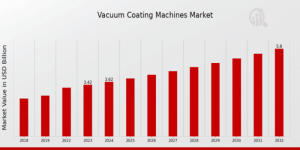Vacuum Coating Machines Market expected to grow at 6.06% CAGR, hitting USD 5.8 Billion by 2032 | ULVAC, Sputter Coater
Vacuum Coating Machines Market grows due to rising demand for advanced coatings in electronics, optics, and automotive sectors.
Vacuum Coating Machines Market an In-Depth Analysis
The global vacuum coating machines market has witnessed substantial growth over recent years, driven by increasing demand across various end-use industries including electronics, automotive, optics, packaging, and solar energy. Vacuum coating machines are essential in processes that involve depositing thin films or coatings in a vacuum environment to enhance surface properties such as hardness, corrosion resistance, and optical reflectivity.
These machines utilize advanced technologies such as Physical Vapor Deposition (PVD), Chemical Vapor Deposition (CVD), and others, ensuring precise control and uniformity in coatings. As industries seek improved performance, aesthetics, and functionality from their products, the adoption of vacuum coating machines continues to rise, contributing to the overall expansion of the market.
Get Free Sample PDF Brochure: https://www.marketresearchfuture.com/sample_request/6330
Key Companies in the Vacuum Coating Machines Market Include
SPECS Surface Nano Analysis
Research Instruments
Veeco Instruments
Oerlikon Balzers
Thin Film Devices
IHI Corporation
VON ARDENNE
Buhler Leybold Optics
Applied Materials
ULVAC
Kurt J. Lesker Company
Sputter Coater
Angstrom Engineering
Sputtering Components Inc
Market Trends Highlights
Several emerging trends are reshaping the vacuum coating machines market landscape. One notable trend is the growing integration of nanotechnology and smart coatings, which are increasingly being used in medical devices, semiconductors, and wear-resistant tools. Furthermore, the push for eco-friendly and sustainable coating technologies is leading manufacturers to adopt low-emission, water-based, and energy-efficient vacuum coating processes.
The proliferation of 5G networks and the Internet of Things (IoT) has also increased the demand for high-precision coatings for electronic components and devices. Additionally, automation and digitalization are revolutionizing machine performance, leading to improved productivity, real-time monitoring, and predictive maintenance features in modern vacuum coating systems.
Market Dynamics
The vacuum coating machines Industry is dynamic and characterized by rapid technological innovation, competitive pricing strategies, and evolving customer demands. One of the main dynamics shaping the industry is the intensifying competition among key players to develop versatile and cost-effective solutions that cater to a wide range of applications. Partnerships, mergers, and acquisitions are common strategic moves among manufacturers to expand their geographic presence and product portfolios.
Moreover, the market is being influenced by increasing R&D investments to explore new coating materials, enhance equipment efficiency, and reduce operational costs. Government initiatives supporting the adoption of green technologies and the development of clean energy sources also play a vital role in propelling the vacuum coating industry forward.
Buy Now Premium Research Report: https://www.marketresearchfuture.com/checkout?currency=one_user-USD&report_id=6330
Market Drivers
The vacuum coating machines market is primarily driven by the rising demand for advanced electronics and semiconductors, where precision and miniaturization are crucial. The growth of the consumer electronics sector, fueled by smartphones, tablets, and wearable devices, has created a continuous need for thin-film coatings that improve device durability and performance. Another significant driver is the expansion of the automotive industry, which requires vacuum-coated parts for decorative finishes, headlamp reflectors, and anti-glare displays.
The solar energy sector also contributes to market growth, as photovoltaic cells benefit from enhanced efficiency through vacuum-deposited coatings. Additionally, the increasing demand for high-performance optical lenses and medical devices coated through vacuum processes is pushing the boundaries of innovation in this market.
Market Restraints
Despite strong growth potential, the vacuum coating machines market faces several challenges and restraints. One key restraint is the high initial investment and maintenance cost associated with vacuum coating systems. These machines require sophisticated infrastructure, skilled operators, and regular upkeep, which can limit adoption among small and medium-sized enterprises.
Furthermore, the complexity of vacuum coating processes and the need for stringent environmental controls may pose barriers to entry for new players. The lack of awareness about the benefits of vacuum coatings in emerging economies also restricts market penetration. Additionally, supply chain disruptions and fluctuations in raw material costs can hinder consistent production and delivery schedules.
Market Segmentation
The vacuum coating machines market can be segmented based on technology, application, end-user industry, and region.
By Technology, the market includes Physical Vapor Deposition (PVD), Chemical Vapor Deposition (CVD), and others such as Atomic Layer Deposition (ALD). Among these, PVD holds a substantial market share due to its wide use in electronics and cutting tools for its durability and cost-effectiveness.
By Application, the market spans decorative coatings, protective coatings, optical coatings, and functional coatings. Protective and functional coatings dominate, given their critical role in extending the lifespan and performance of industrial components.
By End-User Industry, the key sectors include electronics, automotive, aerospace, packaging, medical devices, and energy. Electronics lead in terms of market share, followed closely by automotive and solar energy due to increasing demand for lightweight, corrosion-resistant materials.
Each segment presents unique opportunities and challenges, with manufacturers tailoring solutions to specific industry requirements.
Browse In-depth Market Research Report: https://www.marketresearchfuture.com/reports/vacuum-coating-machines-market-6330
Regional Analysis
Geographically, the vacuum coating machines market is segmented into North America, Europe, Asia-Pacific, Latin America, and the Middle East & Africa.
Asia-Pacific is the dominant region in terms of revenue and production capacity, with countries like China, Japan, South Korea, and India driving demand. The rapid industrialization, growth in consumer electronics manufacturing, and expansion of the automotive sector in this region contribute to its leading position. Moreover, favorable government policies and the availability of cost-effective labor and materials further boost regional growth.
North America holds a significant share of the market, driven by the presence of advanced research institutions, high-tech industries, and strong demand for sophisticated electronics and aerospace components. The United States, in particular, is a hub for innovation in coating technologies, attracting continuous investment.
Europe is another crucial market, with countries like Germany, the UK, France, and Italy emphasizing high-quality coatings for automotive, aerospace, and optical applications. European companies are also at the forefront of sustainable coating technologies, aligning with the EU’s environmental regulations.
Latin America and the Middle East & Africa are emerging markets with growing potential. These regions are witnessing increased infrastructure development, a rising middle class, and growing demand for consumer goods, which indirectly fuels the vacuum coating equipment market.
More Related Reports:
Screw Conveyors Market: https://www.marketresearchfuture.com/reports/screw-conveyors-market-22648
Wire Rope Sling Market: https://www.marketresearchfuture.com/reports/wire-rope-sling-market-22649
Rental Equipment Market: https://www.marketresearchfuture.com/reports/rental-equipment-market-22660
Planting Equipment Market: https://www.marketresearchfuture.com/reports/planting-equipment-market-22658
Pin Insertion Machine Market: https://www.marketresearchfuture.com/reports/pin-insertion-machine-market-22656
Sealless Magnetic Drive Pump Market: https://www.marketresearchfuture.com/reports/sealless-magnetic-drive-pump-market-22684
Spray Drying Equipment Market: https://www.marketresearchfuture.com/reports/spray-drying-equipment-market-22686
Humor as Healing: The Usefulness of Hippopotamus Delivers Joy for Trying Times
Modernizing Whole-Home Entertainment Systems: Key Considerations for Today’s Homeowners
Austin Disaster Relief Network Provides Ongoing Relief and Long-Term Recovery Support Across Central Texas Flood Zones
Więcej ważnych informacji
 Jedynka Newserii
Jedynka Newserii

 Jedynka Newserii
Jedynka Newserii

Konsument

Grupa nowych biednych emerytów stale się powiększa. Ich świadczenie jest znacznie poniżej minimalnej emerytury
Przybywa osób, które z powodu zbyt krótkiego czasu opłacania składek pobierają emeryturę niższą od minimalnej. Tak zwanych nowych biednych emerytów jest w Polsce ok. 430 tys., a zdecydowaną większość grupy stanowią kobiety – wskazują badania ekspertów Instytutu Pracy i Spraw Socjalnych. W ich przypadku krótszy okres składkowy zwykle wynika z konieczności opieki nad dziećmi lub innymi osobami w rodzinie. Wśród innych powodów, wymienianych zarówno przez panie, jak i panów, są także praca za granicą lub na czarno oraz zły stan zdrowia.
Media i PR
M. Wawrykiewicz (PO): Postępowanie z art. 7 przeciw Węgrom pokazało iluzoryczność tej sankcji. Unia wywiera naciski poprzez negocjacje nowego budżetu

Przykład Węgier pokazał, że procedura z artykułu 7 traktatu o UE o łamanie praworządności nie ma mocy prawnej z powodu braku większości, nie mówiąc o jednomyślności wśród pozostałych państw członkowskich. Negocjacje nowego budżetu UE to dobry pretekst do zmiany sposobu części finansowania z pominięciem rządu centralnego. Czerwcowy marsz Pride w Budapeszcie pokazał, że część społeczeństwa, głównie stolica, jest przeciwna rządom Viktora Orbána, ale i na prowincji świadomość konsekwencji działań Fideszu staje się coraz większa przed przyszłorocznymi wyborami.
Firma
Blockchain zmienia rynek pracy i edukacji. Poszukiwane są osoby posiadające wiedzę z różnych dziedzin

Zapotrzebowanie na specjalistów od technologii blockchain dynamicznie rośnie – nie tylko w obszarze IT, ale również w administracji, finansach czy logistyce. Coraz więcej uczelni wprowadza programy związane z rozproszonymi rejestrami, które wyposażają studentów w umiejętności odpowiadające wymogom rynku.
Partner serwisu
Szkolenia

Akademia Newserii
Akademia Newserii to projekt, w ramach którego najlepsi polscy dziennikarze biznesowi, giełdowi oraz lifestylowi, a także szkoleniowcy z wieloletnim doświadczeniem dzielą się swoją wiedzą nt. pracy z mediami.


![Nestlé w Polsce podsumowuje wpływ na krajową gospodarkę. Firma wygenerowała 0,6 proc. polskiego PKB [DEPESZA]](https://www.newseria.pl/files/1097841585/fabryka-nesquik_1,w_85,r_png,_small.png)






.gif)

 |
| |
| |
|